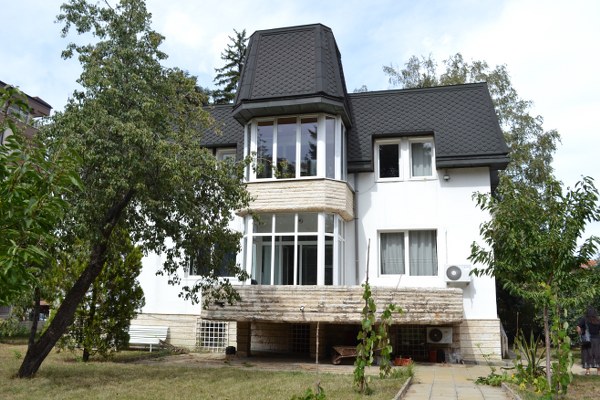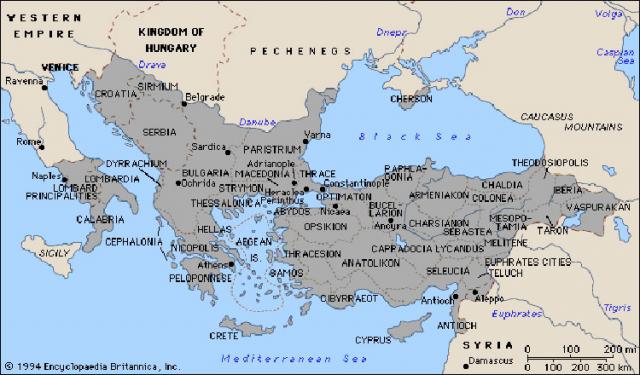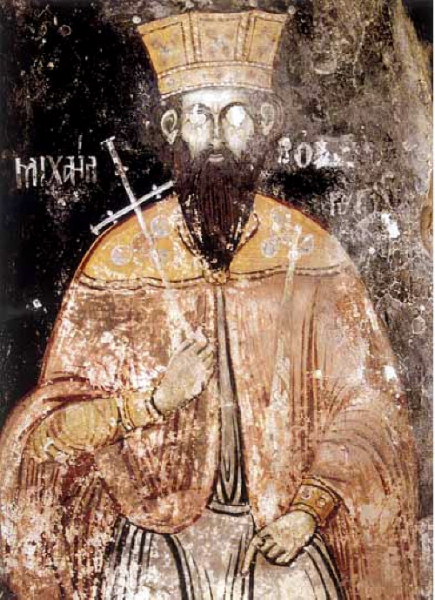Polina Spartyanova
Associate Professor Dr. Vasya Velinova is Director of the Slavo-Byzantine Research Centre "Ivan Dujčev" at Sofia University "St. Kliment Ohridski" and teacher of Old Bulgarian literature. She is the author of four monographs, the latest of which is dedicated to the translation of the Chronicle of Constantine Manasses from the Creation of the World to the reign of Constantine the Great into Bulgarian and to three lists of Slavic manuscripts (co-authored with Professor Xenia Dzhurova and Professor Boryana Hristova). She is currently working on a scientific project related to the translation of Historic Palea. We talked with her about the anniversary of the Slavic alphabet and the Great Moravia Mission of Cyril and Methodius.
This year the Great Moravia Mission of Cyril and Methodius celebrates its 1150th anniversary. How will the Slavo-Byzantine Research Centre "Ivan Dujčev" at Sofia University "St. Kliment Ohridski" celebrate it?

The Slavo-Byzantine Research Centre "Ivan Dujčev" has arranged an exhibition called "The Light of the Letters". It presents the role played by the First Bulgarian Empire in rescuing the Slavic alphabet after the expulsion of Cyril and Methodius’ students from Great Moravia and offers to those who are interested in cultural history specimens of the most precious and ornate Bulgarian medieval manuscripts from the period between the 10th and the 18th centuries. The exhibition has been prepared in cooperation with the National Cultural Institute of the Ministry of Foreign Affairs and presented in all European capitals and many university centres. It was opened on 28 November in Thessaloniki, the hometown of St. Cyril and Methodius, in the Museum of Byzantine Art and it attracted the interest of the cultural community there. Furthermore, the scientists from The Slavo-Byzantine Research Centre "Ivan Dujčev" participated in several international symposia in Bulgaria and abroad, which were devoted to the anniversary.

Has the scientific community found some new facts and hypotheses that would change our notion of the life and work of Cyril and Methodius?
The humanities are continuously developing and, although their findings are not as global as those of the exact sciences, it can be said that we are constantly adding new elements and details to the work of the two brothers. We have greatly enriched our knowledge of their translation work. It turns out that the facts about the translations, which are described in their biographies, are totally correct. It has been established, with the help of textology, that Methodius had really translated the Bible and traces of this translation are present in later manuscripts. Recently, new facts about the role played by Byzantine Emperor Michael III in the preparation of the mission of Cyril and Methodius have been widely discussed as well as new facts about the fate of their students in Bulgaria. Over the recent decades, a large number of newly discovered hymnographic works created in the towns of Pliska and Preslav with the direct participation of Cyril and Methodius' disciples have been published as well. The role of Byzantium and its missionary activity that had led to the creation of the Slavic alphabet has been increasingly emerging as well.
Why had the work of Cyril and Methodius failed to make its way to the Western Slavs and managed to reach the Bulgarian state?
In Bulgaria, the work of Cyril and Methodius had found the support of Bulgarian rulers, of Boris Michael and his son Simeon later. They had created excellent conditions for the development of literary activity and later for making the Bulgarian language the third liturgical language in Europe. This far-sighted policy had allowed other Slavic countries like Russia and Serbia to have a writing system in their own language, using the Bulgarian translations.
Why do you think we find it difficult to admit that Cyril and Methodius are Greeks?
St. Cyril and Methodius have so deeply penetrated our ethnic self-consciousness that we actually do not ask what they are, we automatically take them for Bulgarian saints and, respectively, for Bulgarians. However, this is a subsequent reflex formed during the Bulgarian National Revival. Every serious researcher is aware of the origin of the two Slav apostles. This does not diminish the importance of their work. It is just to the contrary. They are spiritual enlighteners of the Slavs and this fact is beyond the ethnic borders of Bulgarians, Poles, Russians, Serbs, Czechs.... It was just that the celebration dedicated to them was an official state holiday in Bulgaria alone, which is the true home of their work. And when I comment on the origin of Cyril and Methodius with my students, they are aware of the fact that, within this historical context, Byzantium was the most advanced country. It was an undisputed authority. For us, as Bulgarians, it is more important that the writing system created by Cyril and Methodius has preserved us as a nation over the centuries of our vicissitudinous history and Revival Paisij of Hilendar has rightly urged us: Bulgarians, know your people and language ... The language, the written language is the basis of national consciousness. This is what Cyril and Methodius have given us and we have preserved it and developed it.
Is their nationality important for the creation of the Slavic alphabet?
Of course, it is not. According to sources, Cyril was a brilliant linguist, polyglot. He was aware of the majority of the writing systems known at that time. He created a perfect alphabet, reflecting the phonetic characteristics of the language of the southern Slavs. Furthermore, Byzantium was a multiethnic empire and diversity was its daily round.
 How close are the Bulgarian and Greek languages?
How close are the Bulgarian and Greek languages?
They are as close as two neighbouring languages that had closely coexisted for more than a millennium. When Cyril was creating the writing norm of the Old Bulgarian alphabet, he used Greek syntactic structures and periods. A number of Greek words have been preserved in the translation of the Book of the Holy Scriptures. Some have survived and some have been replaced with Bulgarian words. The language of Bulgarian medieval literature is that of the Byzantine rhetoric, defined and adapted in compliance with the Bulgarian consciousness. However, Bulgarian writers have always had an awareness of what can and cannot be adopted.
What are the similarities and differences between the Bulgarian and the Greek alphabet?
If we talk about the Glagolitic alphabet, it is unique. It is reminiscent more of the Ethiopian, Armenian and Georgian writing systems. These are the writing systems of the Byzantine periphery. On the other hand, the Glagolitic alphabet was in synchrony with what was happening in Constantinople after the established worship of icons and the replacement of the majuscule with the minuscule writing system. Despite these similarities with other systems, it remains unique and perfect, as I have already stated. If we talk about its closeness with the Greek writing system, we should turn to the Cyrillic alphabet, which was adapted on the basis of the Greek uncial writing system, which was well known in the Bulgarian lands, as shown by the epigraphy. Chernorizets Hrabar, a Bulgarian writer of the 10th century, wrote that the Bulgarians had been writing in Greek or Latin letters for a long time, but "without structure", without improvement, without specific written characters of the typical sounds of the Slavic language. The Greek letters used were uncial and this had created written stereotypes leading to the creation of the Cyrillic alphabet. This alphabet repeated the Greek typefaces of the letters and added written signs for the Slavic sounds – б (be), ч (che), ц (tse), дз (dze), щ (sht), ж (zhe).
Why do you think the two Byzantine missionaries created a work that hit the Byzantine Empire at its core?
I would not be so categorical. Yes, Byzantium had created a weapon of cultural assimilation which, at one point, had turned against it because the Bulgarian rulers, who had had their own political ambitions and confidence, had stood behind the alphabet. They had used the alphabet to consolidate the Bulgarian state in the Christian culture but also to distinguish it from the Byzantine Empire, from its eternal rival. Years ago, when I was preparing a collection of articles in Bulgarian by Peter Schreiner, a world famous Professor of Byzantine Studies and president of the International Association of Byzantine Studies until 2011, he defined the relations between Bulgaria and Byzantium as diverse and rival, which became the title of the book. I find it very successful.
 How was the autocephalous church created only five years after Christianity became the official religion in Bulgaria? Why did the Byzantine clergy allow this to happen?
How was the autocephalous church created only five years after Christianity became the official religion in Bulgaria? Why did the Byzantine clergy allow this to happen?
One of the conditions set by Boris in the adoption of Christianity from Constantinople was the Bulgarians' right to have an autonomous, independent church. I am convinced that this fact had tilted the scales of all thoughts and doubts of the Bulgarian ruler in favour of Constantinople. He was a khan but also a high priest and all secular and spiritual power was in his hands. He would not sacrifice power and therefore he preferred the model that would allow him to control the spiritual authority, namely an independent church, and resorted to Caesaropapism under which the secular government is superior to the spiritual authority. Otherwise, the creation of the autocephalous church was a continuous process. Byzantium did not yield so easily. Ultimately, while King Peter was in power, we already had a patriarch. Apparently, the shadow of his belligerent father, Simeon, had long been disturbing the peaceful sleep of the Byzantine Emperor. Institution building is a difficult process. It seems that the establishment of the Bulgarian church performing the liturgy in a clear language for the people was equally important for Boris - Michael and Simeon. This was their primary task. And again we come to the work of Cyril and Methodius and I would like to conclude with a quote from the Prologue to the Gospels, a poetical work by Cyril, one of the finest works of Old Bulgarian literature:
"Stripped are the nations without books
Powerless to fight the enemy of their souls....".